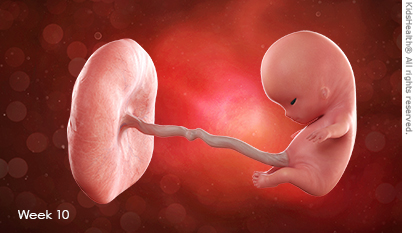Pregnancy Calendar: Week 10
Your Baby's Development
By week 10, all your baby's vital organs have been formed and are starting to work together.
As external changes (such as the separation of fingers and toes and the disappearance of the tail) happen, internal developments do too. Tooth buds form inside the mouth, and if you're having a boy, his testes will begin producing the male hormone testosterone.
Congenital abnormalities are unlikely to develop after week 10. This also marks the end of the embryonic period — in general, the embryo now has a distinctly human appearance. Starting next week, your baby will officially be considered a fetus.
Your Body
Your first prenatal visit, which often takes place around this time, is a milestone. At the doctor's office, you'll go through a series of tests and checks, including having your weight and blood pressure checked. You might also have an external abdominal examination to check the size and position of your baby and have your urine tested.
During the visit, your health care provider (who could be an obstetrician, family doctor, midwife, or nurse practitioner) will do a thorough examination. This includes an internal exam and a breast exam. Your health care provider will also ask you many questions about your medical history and any family health problems. This can help determine if your baby is at risk for genetic diseases.
Another thing your provider will check? Your baby's heartbeat! Using a Doppler stethoscope, you should get to hear it for the first time.
Your provider will probably send you for a blood test to find out whether you're immunized against varicella, measles, mumps, and rubella (German measles), and to find out your blood type and Rh factor. You also may be tested for certain infections, such as syphilis or hepatitis B, and you may be offered an HIV test.
Testing blood for certain genetic disorders is also commonly done — the type of tests offered will depend on your situation and preference.





